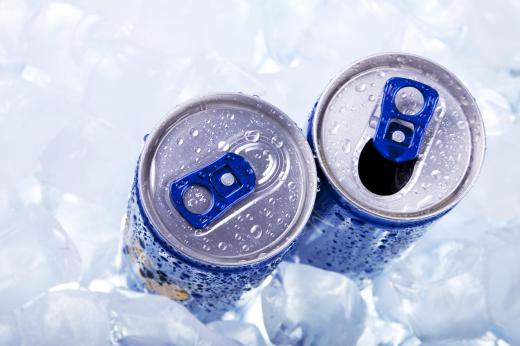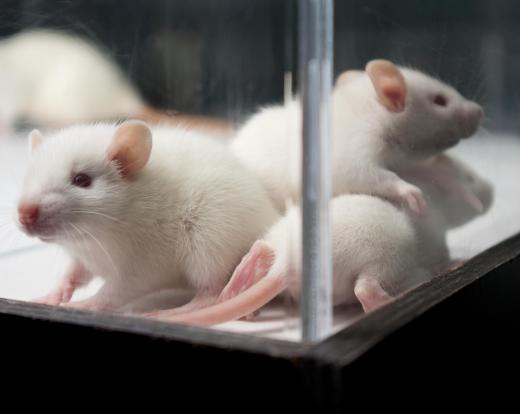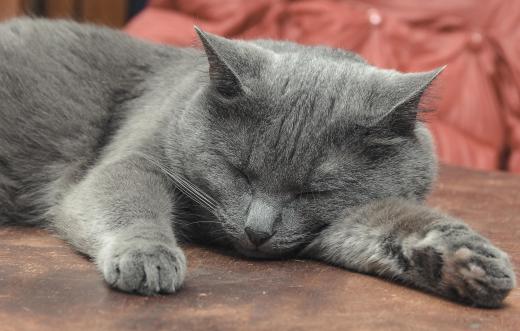What is Taurine?
Taurine, also known as 2-aminoethanesulfonic acid, is a compound that is produced naturally in the human body. It is found in high levels in the skeletal and heart muscles, as well as in white blood cells and the central nervous system. It is an essential component in bile, and aids in the digestion of fats and the absorption of vitamins that are fat-soluble. 2-aminoethanesulfonic acid is also found in seaweed, fungi and bacteria.
The name comes from the fact that the compound was first discovered in the bile of an ox — a kind of bull. The Latin word for bull is taurus. Although it is often described as an amino acid, this is not strictly correct, chemically speaking, but it does resemble these substances.
Functions

The best understood function of taurine is in the formation of compounds in the bile that allow fats and oils to be absorbed. These compounds act like detergents in that they emulsify fats, so that they can be broken down and processed. Some essential nutrients are fat-soluble, so this also helps these substances to be metabolized.
Taurine is also essential to the development of the central nervous system and retina. For this reason, it is given as a supplement to premature babies, as they cannot yet produce this substance themselves. Some animals, such as domestic cats, are unable to produce it in adequate amounts and must therefore have it in their diets.

It appears that 2-aminoethanesulfonic acid may act as an antioxidant, helping to prevent damage to cells and tissue caused by oxidation. For example, biochemical processes in the body produce hypochlorous acid (HOCl) as a by-product. This chemical is a powerful oxidant that has the potential to injure cells. Taurine combines with it to produce a much less toxic compound, taurine chloramine, suggesting that one of its roles may be to remove this toxic chemical.
Possible Benefits

Aside from its known functions in the body, many additional benefits have been claimed, although, as of 2013, some of these have yet to be proven. It may reduce high blood pressure in adults and is being tested as a potential treatment for bipolar depression. Studies on mice have shown that taking supplements while on a high fat diet kept them from gaining weight. In other studies, diabetic rats lost weight and showed lower blood sugar levels.

There is evidence to suggest that this compound may help relieve the symptoms associated with congestive heart failure (CHF), a condition that reduces the heart’s ability to pump blood through the body. Studies have also suggested that it improves liver function in people suffering from some forms of viral hepatitis. Many people may be familiar with this substance as a health supplement, and it is used in a variety of products. Bodybuilders take it as a supplement coupled with creatine, which may help in reducing muscle fatigue and soreness.

Researchers at a well-known UK university claim that taurine may counteract the effects of heavy drinking on the liver because it prevents fat from building up in the organ. There is some concern, however, that this well-publicized finding may act as a disincentive for heavy drinkers to cut down their alcohol intake. There seems to be a popular belief that taurine-rich energy drinks may be the perfect “morning after” treatment after a night of heavy drinking.
Sources
Taurine is present in meat, fish, eggs and dairy products. Since adult humans are able to manufacture the substance from other compounds that are in plentiful supply, it is not normally considered an essential dietary requirement. Although a vegetarian diet is lacking in 2-aminoethanesulfonic acid, many meat-free foods, such as nuts and some vegetables contain the chemical building blocks from which it is manufactured in the human body. The compound is also manufactured synthetically for use in energy drinks and supplements.
Energy Drinks
Many energy drinks contain taurine as an ingredient. Their manufactures advertise many benefits, while others have expressed concern about possible negative effects, particularly if taken in combination with alcohol. The supposed benefits of these drinks include increased energy, better mental performance and improved short-term memory. Possible negative effects include dehydration and abnormal heart rhythms. Since these drinks usually also contain caffeine, it is difficult to determine from tests whether any positive or negative effects they produce are due to the taurine, the caffeine or a combination of both.
Possible Side Effects
Since this compound is found both in foods and in the human body in relatively large amounts, it is considered unlikely to have any adverse effects. Evidence suggests that doses of up to 0.1oz (3g) per day are safe for healthy adults. It is not clear, however, what the safe dosage would be for children, pregnant women or people suffering from certain medical conditions.
AS FEATURED ON:
AS FEATURED ON:















Discussion Comments
Thank you, anon175820. I now understand why energy drinks containing Taurine magically reduces my sensation of pain about 20 minutes afterward. So it's just the Taurine, not the sugar, caffeine, etc. etc. that I need. It also explains why I react differently to coffee, sugar, chocolate, etc. Thanks!
I am giving it a try for frequent age-related aerobic activity-related cramps and minor strains, but I have read that it can cause extreme fatigue in doses over 1 gram/1000 mg, which actually would make it twice as useful. Small doses increase energy and decrease injury potential, while larger doses are a sleep aid.
So what energy drinks contain taurine but not caffeine?
Taurine used to be a traditional Chinese medicine milked from bovine livers (it is a major part of bile and this is where all bile is produced) but synthetic production has been mastered and today's taurine is cruelty-free.
Natural taurine is produced from sea weed mainly but also from fish deposits like blood and intestines.
Taurine was found first in bull semen, thus its name. That was back around 1850-1860, so that semen is quite old in this case.
To the comment about being afraid of stopping producing taurine in the liver.
The liver diminishes taurine production from cysteine if there is enough taurine for producing taurocholates. In the US, this is normally not the case, thus hypercholesterolemia is quite common also in persons without familiar hypercholesterolemia.
By dampening cysteine breakdown at a medium to high level of cysteine input, glutathione is rather produced for storing cysteine to keep it from doing harm in free radical producing reactions. On the other hand, GSH is a very important molecule in preventing harm from free radical processes by being a main molecule in glutathione peroxidase that remove fatty peroxides from circulation.
Low levels of GSH due to low cysteine intake and low taurine intake in the western diet is one of the main mechanisms behind CVD and alike.
In a rather recent study by a Japanese in a WHO Cardiac study it was shown that in a 24H urine secretion study, those with more than about 500 nmol taurine pr day had far lower chance of dying by ischemic heart disease than those below.
The western diet and north european countries had all far less than 500 mmol/d, US and scandinavia about 80-100 mmol/d, Portugal and Spain more than 1000 mmol/d.
Try rather to get taurine by eating fat sea fish than drinking sugar laden energy drinks.
And by the way, drinking alcohol mobilizes taurine from the cells in muscle, liver, brain and so on and is part of the mechanism. This is why you pee much more when drinking alcoholic brews than by drinking the same amount of water.
The water loss induced by alcohol and the loss of taurine is the main reason you get a hangover -- because cells then shrink and start the nerves triggering pain signals and since taurine is lacking, a main inhibitor of pain nerve impulse transmissions, you start to get that hangover feeling.
Drinking alcohol will relieve these pains by increasing again cell volumes, especially nerve cells and thus stop them in firing, but drinking water and taurine will have just the same effect.
The inhibition of fat liver is another story.
Regards from a taurine researcher.
Naturally occurring: Hemlock, cowbane, strychnine, oleander, etc. and hundreds more. All naturally occurring, and poison! Would you take these? After all, they are natural. Of course not. So stop with the natural and start with safe. Is it safe is what you need to know.
In regards to comment 10 by Anon37164: Creatine has no proven effects on testosterone nor the metabolic mechanisms to influence the male sex hormone. Creatine is stored in your muscles in the form of phosphocreatine where it donates its phosphate group to ADP(adenosine diphosphate) to reform usable ATP(adenosine triphosphate). This is how it allows you to work out longer and harder.
Also, the use of taurine has been very beneficial in treating patients with congestive heart failure and select atrial arrhythmias. Its uses in the body look very promising when not coupled with energy drinks.
People need to get smart in what they eat. taurine is naturally made by body so it is good. small doses, I think, are better.
There are a lot of things the FDA approves that kill people on a daily basis. I have no concern or respect for the FDA.
As long as you pay them enough money, they will "approve" anything. Just look how many people die from over-the-counter pain relievers like Advil and aspirin. The numbers are in the tens of thousands.
So when someone said that "The FDA would not approve it if it was bad." has no idea what the FDA is all about.
OK think about it: if taurine was bull semen or urine it would not be approved by the FDA, meaning energy drinks could not be sold in most stores.
Taurine is not bull semen. It is synthetic and made in a lab. it is healthy for you. The person who said taurine is bull semen wanted all of the energy drinks for himself.
I've been drinking energy drinks with Taurine in them for five years. I stopped consumption of coffee five years ago. Now i need my daily fix of taurine. Big difference in energy and mood! All I need is one can. NOS is my favorite but hard to find.
in some of the regions of the world, taurine is being used as a appetizer. is it true?
If your body did stop producing because you took supplements and such, then if you stopped the supplements would your body start producing it again?
i heard taurine comes from bull's urine. is it true?
i've been heard that taurine comes from the bull. is it true?
wow and I'm drinking a monster right now.
So is taurine healthy?
Ultra Man Daily Multi, is a multivitamin that contains. taurine. check it out -- you'll see!
taurine is not found in multivitamins. It is sold as a supplement on its own or combined with other ingredients in energy supplements.
If your body produces taurine, and you take it regularly every day, wouldn't your body stop producing taurine and rely on the doses you take?
Since that's what happens when you take steroids, you get doses of testosterone which males produce from their testicles, which is why body builders got shriveled up raisins for testicles.
Also, is there a certain organ that produces taurine?
I use it before every workout and every run and have been for the last two months solid. I am a student and have gained almost ten pounds of fat since starting college in September and it certainly isn't from eating junk food.
It's from sitting on my tushkie all day studying where as before I was standing on my feet all day at work. I'm not sure if the taurine helps, but I have lost three pounds of fat,and I am putting in the extra effort into my workouts.
I've read that sometimes it takes two to three months to notice an ergogenic effect. We shall see.
I have wondered for a long time what taurine was. For a moment I thought it was another form of caffeine since it was maybe one of the highest measurements on the label of contents. It's origin is why, not that many people know about it, even though we are drinking a laboratory made substance. I also read that it is found in the skeletal and muscle tissue of humans. In other words our body automatically makes this substance.
Taurine is in most energy drinks like NOS, which is my favorite, Rock Star, Monster, Amp, etc. Most have the suggested amount for a daily basis. All the scary words like Taurine, L-Arginine, Ginseng, Inositol, etc. are just herbs that are naturally found in nature so don't freak out. For most things if you can't pronounce it, it is probably man made.
As with other chemicals already produced naturally in the body....be careful about jumping onboard with supplements that overload the system with what it already produces. The body can stop producing taurine with prolonged use like what Creatine does with testosterone. By the way...if you're going to take this with Creatine make sure the drink or other intake doesn't have caffeine in it....big no no with Creatine. Bottom line...stay away from all that crap...feeling tired...get off the couch and run...the heart muscle is the only one that counts.
Actually thought taurine is found in bull semen and urine. that is *not* what is used in the food industry. Most use synthetic source that is also vegan friendly. Taurine contrary to rumor, is a very good enrichment for the heart and muscles. Bottom line there is no Sperm in your Redbull. So enjoy a Jaeger Bomb or two. . .or three or. . .
put you off energy drinks? everything this says about taurine is good and its in a lot of drinks like nos
taurine used in infant milk formula, is it synthetic?
you have put me off all energy drinks!!
they get the taurine from bull semen.
for now, its just in your rockstar.
Is taurine included in multivitamins or just energy drinks?
Post your comments